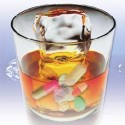The language of intoxication: The term 'drunk' doesn't really cut it any more
The language that drinkers typically use to describe alcohol’s effects on them are quite different from the language used by alcohol researchers, no doubt limiting researchers’ understanding of self-reported alcohol use. New findings show that researchers could do well to tap into a wide spectrum of terms used by drinkers to describe their levels of intoxication; also, these tend to differ by gender.
Results will be published in the March issue of Alcoholism: Clinical & Experimental Research and are currently available at Early View.
“There is tremendous variation in what effect a specific dose of alcohol will have in different individuals and in the same person on different occasions,” explained Ash Levitt, a graduate student in the department of psychological sciences at the University of Missouri, as well as corresponding author for the study.
“As social and cultural animals, humans have developed a rich and diverse vocabulary of intoxication-related slang to describe the subjective states they are experiencing while drinking,” said Levitt. “However, alcohol researchers have largely ignored the language of intoxication.” Instead, he added, researchers often rely on objective measures which, although critical to alcohol research, do not reflect individual subjective differences in drinking experiences.
Moreover, most studies in self-report research that do use subjective assessments, he said, rely on single-item subjective assessments of intoxication. For example, “How often in the past 30 days did you drink enough to get ‘drunk?” or “On a 1-100 scale, how ‘drunk’ do you feel right now?” Even though “drunk” is the oldest English-language intoxication-related synonym currently used today, Levitt noted, individuals do not perceive “drunk” in the same way, and just because something is commonly used does not mean that there aren’t better alternatives.
Researchers used a web-based approach to survey two different samples, n=290 (140 males, 150 females) and n=146 (73 males, 72 females), of university undergraduates who ranged in age from 17 to 24 years. Each participant was asked about their familiarity and usage of a number of intoxication-related words.
“We found that intoxication-related terms reflected either moderate or heavy levels of intoxication, and that ‘drunk’ reflected a level of intoxication somewhere between moderate and heavy,” said Levitt. “Men tended to use heavy-intoxication words more than women, which were also relatively more forceful in their tone, such as ‘hammered.’ Women tended to use moderate intoxication words more than men, which were also relatively more euphemistic, such as ‘tipsy.’ This is similar to other gender differences in slang usage, for example, men ‘sweat’ and women ‘glow.'”
Women’s use of intoxication terms could have important public health and methodological implications, said Levitt.
“Their use of ‘tipsy’ reflected an average of four drinks over two hours, which actually meets binge-drinking criteria for women but not men,” he said. “Therefore, women could be binge drinking while psychologically perceiving their level of intoxication as being ‘tipsy’ or relatively benign, as opposed to heavier levels of intoxication that would be described with less euphemistic terms, such as ‘hammered’ or ‘wasted.’ Such a perception could potentially mislead women, for example, to feel as though they are capable of driving after drinking because they are ‘only tipsy.'”
Levitt added that these findings also have implications for clinicians. “Discrepancies between objective and subjective effects can help the clinician assess tolerance and sensitivity,” he said. “They could also aid in the development of gender-sensitive interventions. Previous research has shown that heavy-drinking interventions work best when individual feedback is not only personalized, but also gender-specific. Our findings can help clinicians improve these interventions by helping them understand which terms men and women differentially use.”
source: Alcoholism: Clinical & Experimental Research
